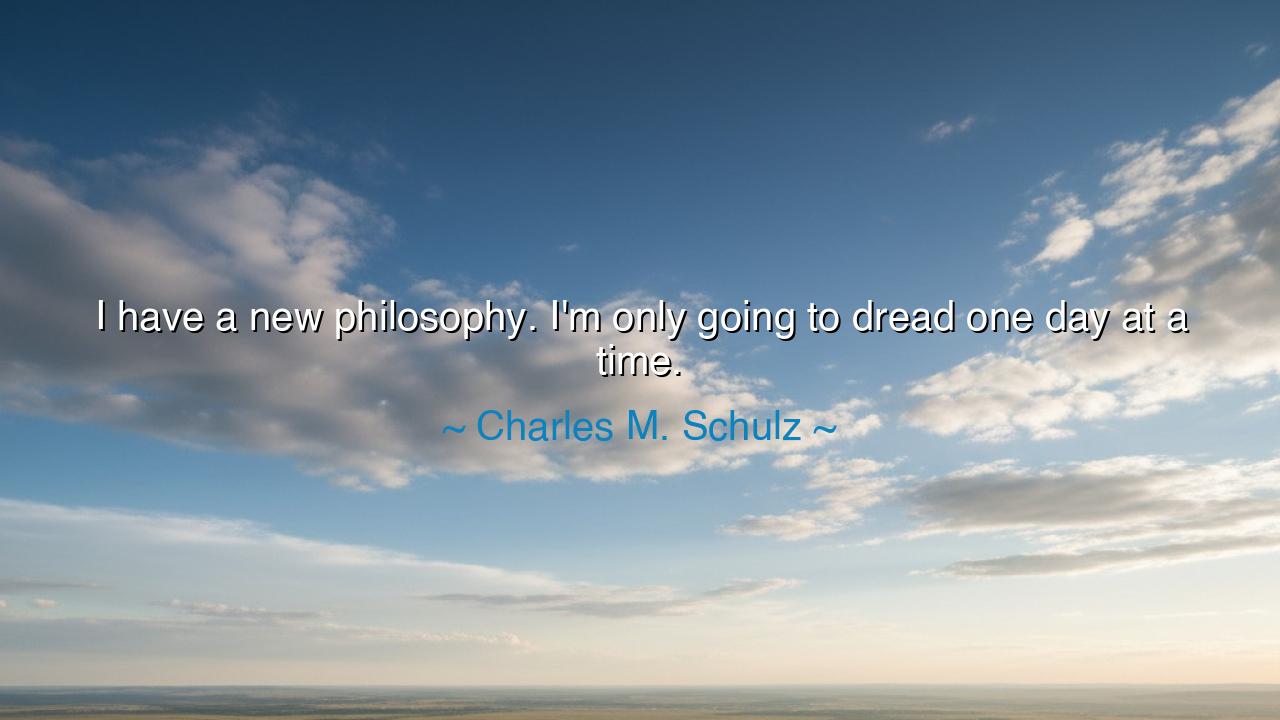
I have a new philosophy. I'm only going to dread one day at a






In the words of Charles M. Schulz, “I have a new philosophy. I'm only going to dread one day at a time.” These words, simple yet profound, offer us a vision of how to face the overwhelming burdens of life with a mindful and measured approach. It speaks to the wisdom of limiting our focus, recognizing that the weight of the world, when carried all at once, becomes too heavy to bear. The timeless truth contained in this quote is that we can only live in the present moment. The past is behind us, the future is uncertain, and to carry both the future's worries and the weight of yesterday is to invite unnecessary suffering.
In the ancient world, great philosophers often grappled with the question of how to endure life’s hardships. The Stoics, for instance, taught that our only true power lies in how we respond to the world around us. Epictetus famously stated, “We cannot choose our external circumstances, but we can always choose how we respond to them.” This aligns perfectly with Schulz’s sentiment—dreading the future, holding the entire expanse of time in our minds, is beyond our control and only leads to anxiety. It is not the magnitude of the task but the way we confront it that determines our peace.
In a world so full of uncertainties, this approach can be seen as a way of finding sanctuary within the chaos. Imagine the warrior standing at the edge of battle, the chaos of the world around him. If he allows himself to think of every foe, every possible outcome, his courage will falter. But if he steadies his mind, focusing only on the immediate moment, the step he must take, the enemy before him, he can find the strength to fight. So too does the wise person face the overwhelming tides of life: one day at a time.
We are reminded of the story of the great philosopher Buddha, who in his moments of meditation, sought to find peace not in the world’s grand design, but in the quiet and stillness of the present moment. Buddha taught that suffering is an inherent part of existence, but the source of our suffering is our attachment to things beyond our control. By focusing on the present, by releasing the fear of what might come, we find freedom from that suffering. Just as Schulz suggests, Buddha’s teachings remind us to face only what is before us, letting go of the anxiety that lies in what has yet to be.
Consider the great explorers of history, those who ventured into unknown lands, driven by the promise of discovery. Robert Falcon Scott, for example, embarked on his fateful journey to the South Pole with the hope of making history. Yet, each step he took was an answer to the question, "What is before me right now?" His unwavering resolve was not based on the vast unknown that lay ahead, but on the task of the present moment: navigating the harsh winds, battling the cold, and keeping his men focused on what could be done today. It is through this constant attention to the present that he, and many others, found their purpose and courage, even in the face of seemingly insurmountable odds.
In modern times, this philosophy can be particularly helpful as we navigate the complexities of our world. The human experience today is fraught with constant information, expectations, and the demands of an increasingly fast-paced world. Schulz teaches us that to carry the weight of all of tomorrow’s worries today is not only a burden, it is a disservice to the life we have right now. We must remind ourselves that the future will come, and we will face it with the tools we have at that moment, but for now, we must honor today.
The lesson here is one of focus and acceptance. Life is a series of moments, not a monolithic mountain of obstacles to be conquered all at once. We must embrace each day as it comes, with all its challenges, joys, and uncertainties, yet we must not allow ourselves to be consumed by the weight of the future. To live wisely, we must be present, and in doing so, we ease the burden of anxiety that so often overwhelms us. Each day is a new chapter, and each day offers us the opportunity to choose how we respond to the world, not as a whole, but in small, manageable portions. And so, we live—one day at a time—finding peace in each moment, regardless of the chaos around us.






AAdministratorAdministrator
Welcome, honored guests. Please leave a comment, we will respond soon